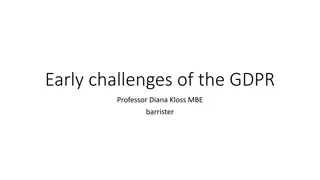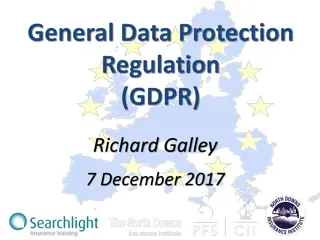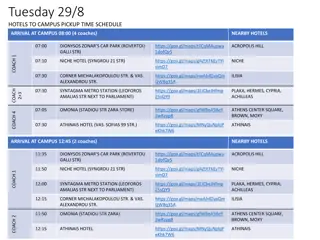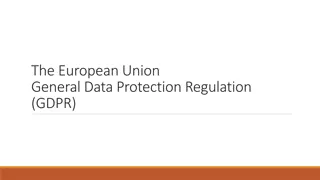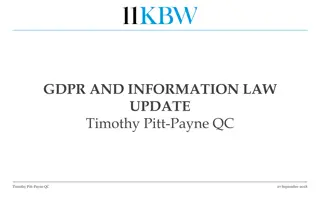Impact of GDPR on Condo-Hotels and Property Managers
The General Data Protection Regulation (GDPR) has significant implications for condo-hotels and property managers. This EU regulation, effective since May 25, 2018, regulates the processing of personal data, including collection, use, and transfer, affecting entities with ties to the EU. Non-compliance can lead to hefty fines of up to 20 million euros or 4% of annual revenue. Unlike US standards, GDPR is broader in its definition of personal data, covering a range of information that could identify individuals. Entities with international guests are particularly at risk and must ensure compliance to avoid severe penalties.
Download Presentation

Please find below an Image/Link to download the presentation.
The content on the website is provided AS IS for your information and personal use only. It may not be sold, licensed, or shared on other websites without obtaining consent from the author.If you encounter any issues during the download, it is possible that the publisher has removed the file from their server.
You are allowed to download the files provided on this website for personal or commercial use, subject to the condition that they are used lawfully. All files are the property of their respective owners.
The content on the website is provided AS IS for your information and personal use only. It may not be sold, licensed, or shared on other websites without obtaining consent from the author.
E N D
Presentation Transcript
Hot Legal Topics Affecting Condo-Hotels and Onsite Property Managers Daniel F. Benavides, Esq. Daniel J. Barsky, Esq. Shutts & Bowen LLP
Cybersecurity and Data Privacy The General Data Protection Regulation, a/k/a (Approximately 800 pounds )
The General Data Protection Regulation (GDPR) What is it? European Union Regulation Introduced 2012 Adopted 2016 Effective MAY 25, 2018 Regulates processing of personal data ( PD ) (those are defined terms in the regulation). Includes the collection, use, transfer, monitoring, tracking, and viewing(!!) of personal data.
The General Data Protection Regulation (GDPR) So, it s an EU regulation what s the big deal? Rights follow EU citizens around the world. UK is following suit with Data Protection Bill that will align with GDPR, so Brexit is a non-issue. This means If you have a physical presence in the EU; or If you do business in the EU; or If you collect personal data from EU residents; or You re open to business from EU residents GDPR DOES OR MAY APPLY TO YOU!
The General Data Protection Regulation (GDPR) Why should you care? GDPR probably applies to you if you have international guests. Violation = up to 20 million or 4% of the worldwide annual revenue of the prior financial year, whichever is higher. The EU is not messing around!!!
The General Data Protection Regulation (GDPR) Is fundamentally different from any other digital privacy law currently in existence. Covers personal data or personal information , which includes. Compare to US standards of personally identifiable information ( PII ). PII is much narrower
The General Data Protection Regulation (GDPR) Personal Data Personally Identifiable Information information about an individual, including names and email addresses, but excludes IP addresses and cookies since they cannot be used to identify a specific person on their own any information relating to a person, including names, email addresses, social media posts, IP addresses (even dynamic IP addresses), pseudonyms/handles, and cookies because they can be traced to a person and combined with other data to identify a specific person GDPR COVERS MUCH MORE DATA!
The General Data Protection Regulation (GDPR) GDPR is different from(but related to) the Cookie Law
The General Data Protection Regulation (GDPR) How broad is GDPR? Processing of Data (a touchstone of applicability) includes: Collection. Recording. Organization. Structuring. Storage. Adaptation or alteration. Retrieval. Consultation. Use. Disclosure by transmission. Dissemination or otherwise making available. Alignment or combination. Restriction (that is, the marking of stored data with the aim of limiting its processing in the future). Erasure. Destruction.
The General Data Protection Regulation (GDPR) Seven data protection principles at the heart of GDPR: 1. Lawfulness, fairness, and transparency (in relation to the data subject). Exactly what it sounds like. 2. Purpose limitation. Must be collected only for specified, explicit, and legitimate purposes. 3. Data minimization. Must be adequate, relevant, and limited to what is necessary in relation to the purpose for which it is processed. 4. Accuracy. Data that is inaccurate with regard to the purposes for which it is processed must be erased or rectified without delay.
The General Data Protection Regulation (GDPR) 5. Storage Limitation. PD must not be kept in a form which permits identification of data subjects for longer than necessary for the purposes for which the data is processed. 6. Integrity and Confidentiality. PD must be processed in a manner that ensures security, including protection against unauthorized or unlawful processing and against accidental loss, destruction, or damage. 7. Accountability. Data controller must be able to demonstrate compliance.
The General Data Protection Regulation (GDPR) GDPR magnifies a pre-existing business tension: You want to collect information on your guests for a number of reasons: Marketing and Promotions Enhancing experience Intercepting problems (being proactive) to prevent negative reviews Internal analytics and modeling But, collecting and utilizing this comes with liability: Data breach GDPR
The General Data Protection Regulation (GDPR) Because the data is valuable, we cannot throw the baby out with the bathwater. Only options are: 1. Segregate data between EU and non-EU subjects and create parallel systems (difficult to do, costly); or 2. Refuse all EU customers (bad business and probably illegal); or 3. Comply with GDPR.
Complying with the GDPR The GDPR defines consent as a (1) freely given, (2) specific, (3) informed, and (4) unambiguous indication of the data subject's wishes by which he or she, by a statement or by a clear affirmative action, signifies agreement to the processing of his or her personal data. A statement can include a written statement (including by electronic means) or an oral statement. Examples of affirmative actions include: Ticking a box when visiting a website. Choosing technical settings for an online service. Any other conduct which clearly indicates in this context the data subject's acceptance of the proposed processing of their personal data.
Complying with the GDPR Silence, pre-ticked boxes or inactivity should not normally constitute consent. When the processing has multiple purposes, consent should be given for all of them. The data controller must be able to demonstrate that "the data subject has consented to processing of his or her personal data." For consent to be informed, the data subject should be aware of at least the data controller's identity and the intended purposes of the processing.
Complying with the GDPR Some Examples Who here has received one of these emails?
Complying with the GDPR Some Examples Guest registration cards Room Number Room Type Arrival Date Departure Date Total Nights Name Company Address Postal Code Adults Children Source Deposit Payment type City State (Prov.) E-mail Telephone Confirmation Number Daily Rate Total Rate No ______ Yes ______ ($_______ USD/Day Tax Inclusive Overnight Charge) Parking: By signing below, I hereby agree to be held personally liable for all costs and charges relating to the above-referenced reservation including, without limitation, the total room rate and any incidental charges (collectively, Charges ). I further agree to be held personally liable and fully indemnify _________________ for any and all claims, demands, damages, liabilities, expenses, losses of every nature and kind (including reasonable attorneys fees) (collectively, Claims ) arising out of my intentional or negligent acts and/or the intentional or negligent acts or omissions of my guests or invitees. I hereby authorize the hotel and/or its affiliates to charge the credit or debit card on file with the hotel for any and all Charges and/or Claims, and I certify that I am an authorized user of such credit or debit card and will not dispute any Charges or Claims with my bank or credit card company. Notice to Debit Card Users: By submitting your debit card as a method of payment you are authorizing an approval to be secured on your checking account. The amount of the approval will be deducted from your checking account and reduce your available balance. I understand and agree that money, jewelry and other valuables brought to the hotel are at the guest s sole risk, and that the hotel shall not be responsible for any loss or damage thereto. This is a non-smoking hotel. Smoking is only permitted in designated open areas. In case of smoking indoors, I understand and agree that the hotel may charge my debit or credit card a minimum fee of $_________ daily for deep cleaning. No plug-in appliances or equipment are permitted on the balconies and must remain indoors at all times. The use of extension cords is strictly prohibited. I have read and understand all terms and conditions described above and agree to comply with the foregoing terms and conditions and all other hotel rules and regulations applicable to guests. Guest Signature ___________________________________________________ Print Name: _______________________________________ Date:
Complying with the GDPR Some Examples Add language I hereby acknowledge receiving a copy of the Hotel s Data and Privacy Policies and DO or DO NOT consent to the processing of my personal data for the following purposes: [list each purpose separately].
Complying with the GDPR Some Examples Update websites with lightboxes/popups for compliance. Also, update website privacy policy which should be separate from terms and conditions.
Complying with the GDPR Some Examples General permission and bundled permission are not GDPR compliant. Information We Collect About You and How We Collect It. We collect several types of information from and about users of our Website, including information: by which you may be personally identified, such as name, postal address, e-mail address, telephone number,[ social security number][ or [ANY OTHER INFORMATION THE WEBSITE COLLECTS THAT IS DEFINED AS PERSONAL OR PERSONALLY IDENTIFIABLE INFORMATION UNDER AN APPLICABLE LAW]/any other identifier by which you may be contacted online or offline] ("personal information"); that is about you but individually does not identify you, such as [SPECIFY TYPES OF INFORMATION]; and/or about your internet connection, the equipment you use to access our Website and usage details. We collect this information: Directly from you when you provide it to us. Automatically as you navigate through the site. Information collected automatically may include usage details, IP addresses, and information collected through cookies[, web beacons,] [and other tracking technologies][include separate provisions for each]. [From third parties, for example, our business partners.]
Complying with the GDPR Some Examples How We Use Your Information. We use information that we collect about you or that you provide to us, including any personal information: To present our Website and its contents to you. To provide you with information, products, or services that you request from us. To fulfill any other purpose for which you provide it. [To provide you with notices about your [account/subscription], including expiration and renewal notices.] To carry out our obligations and enforce our rights arising from any contracts entered into between you and us, including for billing and collection. To notify you about changes to our Website or any products or services we offer or provide though it. [To allow you to participate in interactive features on our Website.] [DESCRIBE ANY OTHER USES] In any other way we may describe when you provide the information. For any other purpose with your consent. [We may also use your information to contact you about [our own and third-parties'] goods and services that may be of interest to you. If you do not want us to use your information in this way, please [check the relevant box located on the form on which we collect your data (the [order form/registration form])/adjust your user preferences in your account profile.] For more information, see Choices About How We Use and Disclose Your Information. We may use the information we have collected from you to enable us to display advertisements to our advertisers' target audiences. Even though we do not disclose your personal information for these purposes without your consent, if you click on or otherwise interact with an advertisement, the advertiser may assume that you meet its target criteria.]
The General Data Protection Regulation (GDPR) This is just a brief overview of GDPR. The regulations and requirements are far more complex (and onerous). There is no one size fits all solution as each company (and even each property within a company) processes personal data differently and for different purposes.












